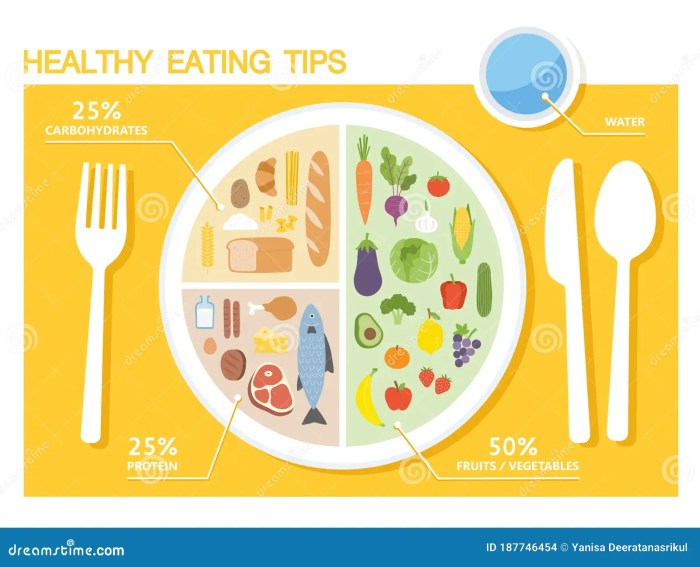Balanced Diet Tips are crucial for maintaining overall health and well-being. From understanding the importance of nutrient-rich foods to practical meal planning strategies, this guide will help you navigate the world of healthy eating with ease.
Let’s dive into the components of a balanced diet, explore tips for achieving it, understand the effects of an imbalanced diet, and learn how to tailor your diet for specific health goals.
Importance of a Balanced Diet
A balanced diet is crucial for maintaining overall health and well-being. It provides the necessary nutrients that our bodies need to function properly and stay healthy.
Essential Nutrients in a Balanced Diet
Some examples of nutrients needed in a balanced diet include:
- Protein: Essential for muscle growth and repair.
- Carbohydrates: The main source of energy for our bodies.
- Fats: Important for cell function and hormone production.
- Vitamins and minerals: Play a key role in various bodily functions and overall health.
Benefits of Maintaining a Balanced Diet for Weight Management
Keeping a balanced diet can also help with weight management. By consuming the right amount of nutrients and avoiding excessive intake of unhealthy foods, you can maintain a healthy weight and prevent issues like obesity.
Components of a Balanced Diet

To maintain a healthy lifestyle, it is essential to consume a balanced diet that includes a variety of nutrients. The components of a balanced diet consist of various food groups that provide different essential nutrients necessary for overall well-being.
Food Groups in a Balanced Diet
- Vegetables: Include dark leafy greens, colorful vegetables, and starchy vegetables. Recommended daily serving: 2-3 cups.
- Fruits: Incorporate a variety of fruits, both fresh and dried. Recommended daily serving: 1.5-2 cups.
- Grains: Opt for whole grains like brown rice, quinoa, and whole wheat bread. Recommended daily serving: 6-8 ounces.
- Proteins: Choose lean sources of protein such as poultry, fish, beans, and nuts. Recommended daily serving: 5-6.5 ounces.
- Dairy: Include low-fat or fat-free dairy products like milk, yogurt, and cheese. Recommended daily serving: 3 cups.
Role of Nutrients in a Balanced Diet
Carbohydrates: Serve as the primary source of energy for the body, especially for brain function. Include whole grains, fruits, and vegetables in your diet.
Proteins: Essential for building and repairing tissues, enzymes, and hormones. Consume a variety of protein sources to meet your body’s needs.
Fats: Important for absorbing fat-soluble vitamins and providing energy. Opt for healthy fats like avocados, nuts, and olive oil.
Vitamins: Play a crucial role in metabolism, immunity, and overall health. Ensure a diverse diet to obtain a range of vitamins.
Minerals: Necessary for various bodily functions, including bone health, fluid balance, and nerve function. Incorporate foods rich in minerals like calcium, iron, and potassium.
Tips for Achieving a Balanced Diet: Balanced Diet Tips
Maintaining a balanced diet is crucial for overall health and well-being. Here are some practical tips to help you plan your meals, control your portions, and incorporate a variety of foods into your daily routine.
Meal Planning
Meal planning is essential for ensuring you consume a balanced diet. Consider the following tips:
- Plan your meals in advance to include a variety of food groups.
- Include fruits, vegetables, whole grains, lean proteins, and healthy fats in each meal.
- Prepare meals at home to have better control over ingredients and portion sizes.
Portion Control
Portion control plays a key role in maintaining a balanced diet. Here are some tips to help you manage your portions:
- Use smaller plates to avoid overeating.
- Measure out appropriate serving sizes to prevent consuming excess calories.
- Pay attention to hunger cues and stop eating when you feel satisfied, not stuffed.
Variety of Foods
Incorporating a variety of foods into your meals ensures you receive a wide range of nutrients. Here are some suggestions to diversify your diet:
- Try new fruits and vegetables to explore different flavors and textures.
- Include different types of proteins such as beans, legumes, fish, poultry, and nuts.
- Experiment with herbs and spices to enhance the taste of your dishes without relying on excess salt or sugar.
Effects of an Imbalanced Diet

Following an imbalanced diet can have serious consequences on your overall health and well-being. When your body doesn’t receive the right mix of nutrients, it can lead to a variety of negative impacts.
Nutrient Deficiencies and Excess, Balanced Diet Tips
- Deficiency in vitamin C can lead to scurvy, a condition characterized by weakness, anemia, and gum disease.
- Excess intake of sodium can result in high blood pressure, putting you at risk for heart disease and stroke.
Health Conditions Resulting from Imbalanced Diet
- Obesity: Consuming too many calories from unhealthy fats and sugars can lead to weight gain and obesity, increasing the risk of diabetes and heart disease.
- Osteoporosis: Lack of calcium and vitamin D in the diet can weaken bones, leading to a higher risk of fractures and osteoporosis.
- Anemia: Insufficient iron intake can result in anemia, causing fatigue, weakness, and difficulty concentrating.
Balancing Diet for Specific Health Goals
To achieve specific health goals, such as weight loss or muscle gain, it is essential to adjust your balanced diet accordingly. Adapting your diet to meet specific dietary requirements, like vegetarian or gluten-free, is also crucial. Additionally, staying hydrated plays a vital role in maintaining a balanced diet.
Adjusting Diet for Weight Loss or Muscle Gain
- Focus on consuming lean proteins, such as chicken, fish, tofu, or beans, to support muscle growth.
- Increase your intake of fruits, vegetables, and whole grains to provide essential nutrients while managing calorie intake for weight loss.
- Monitor portion sizes and consider consulting a nutritionist or dietitian for personalized guidance.
Adapting Diet for Specific Dietary Requirements
- For a vegetarian diet, ensure you are getting enough protein from sources like legumes, nuts, seeds, and dairy alternatives.
- Choose gluten-free grains like quinoa, rice, and oats if following a gluten-free diet, and be mindful of hidden sources of gluten in processed foods.
- Read food labels carefully and consider supplements to meet any potential nutrient deficiencies from dietary restrictions.
Importance of Hydration
- Water is essential for digestion, nutrient absorption, and overall bodily functions, so aim to drink an adequate amount throughout the day.
- Stay hydrated to support metabolism, energy levels, and cognitive function, which are all crucial for achieving your health goals.
- Include hydrating foods like fruits and vegetables in your diet to supplement your water intake.